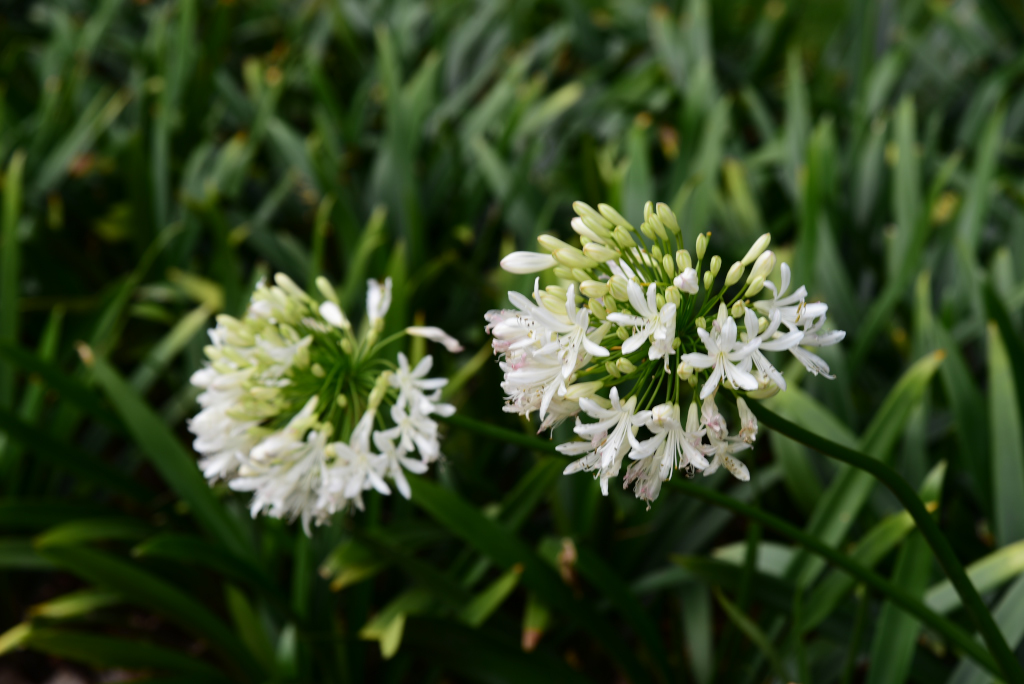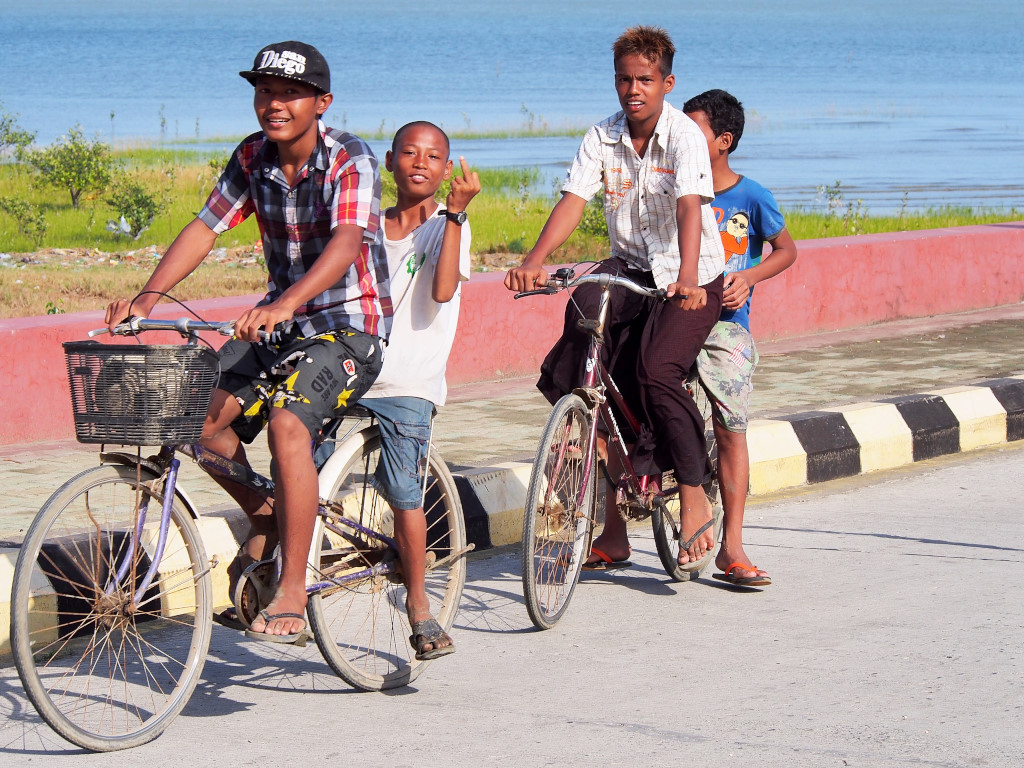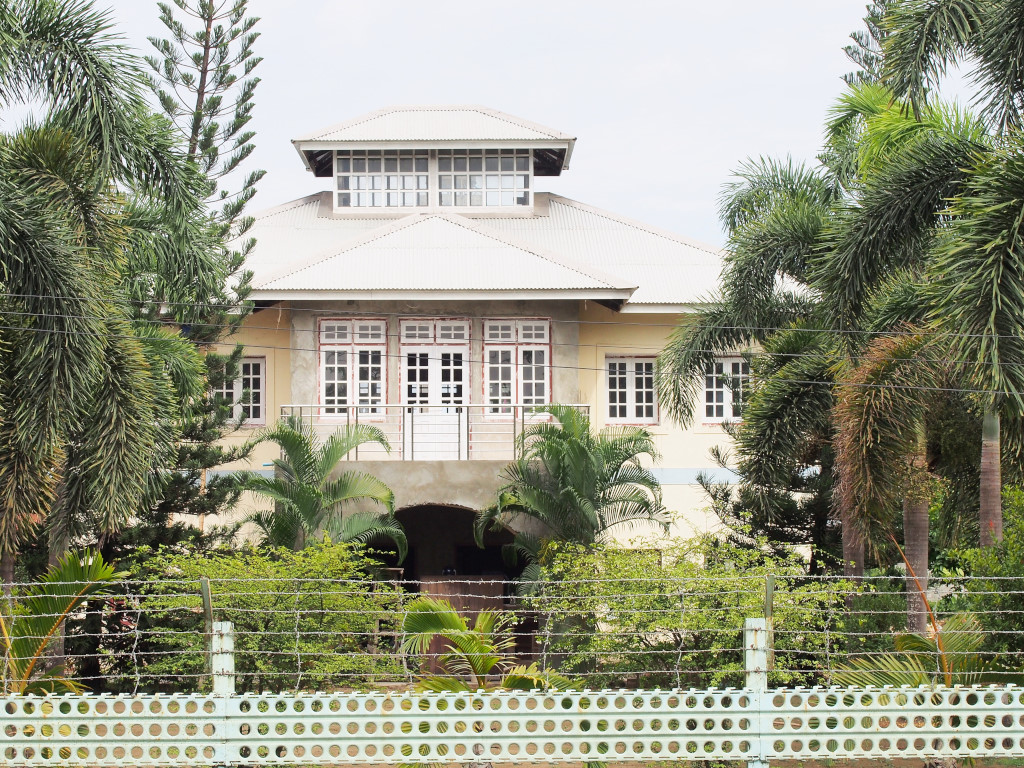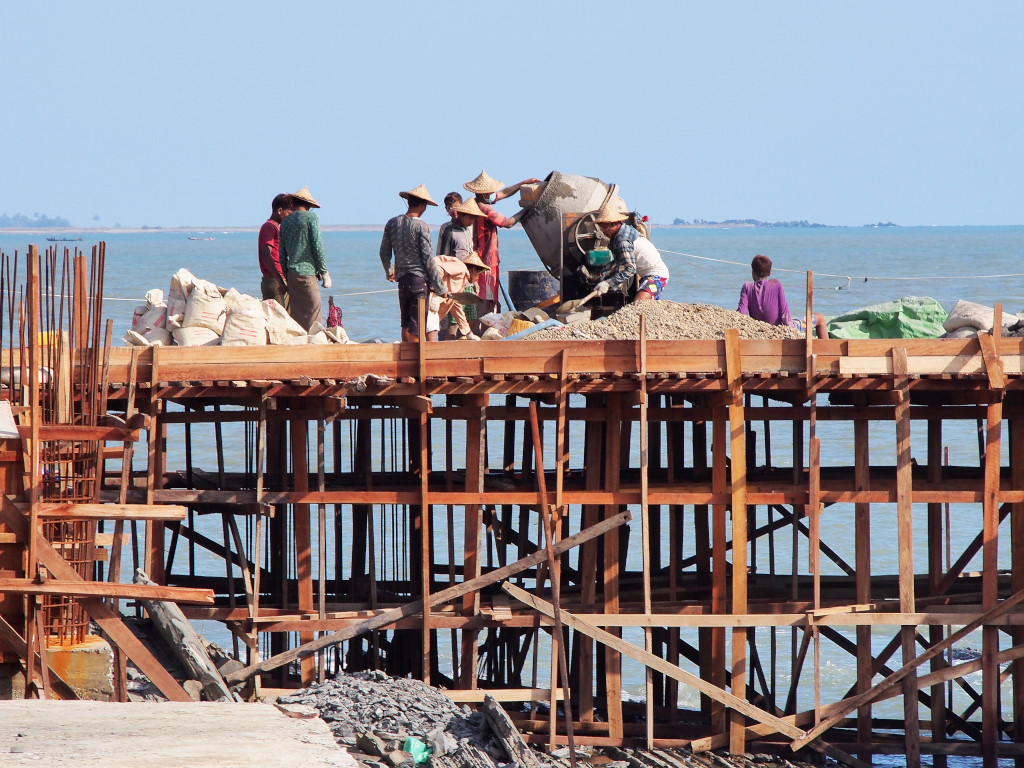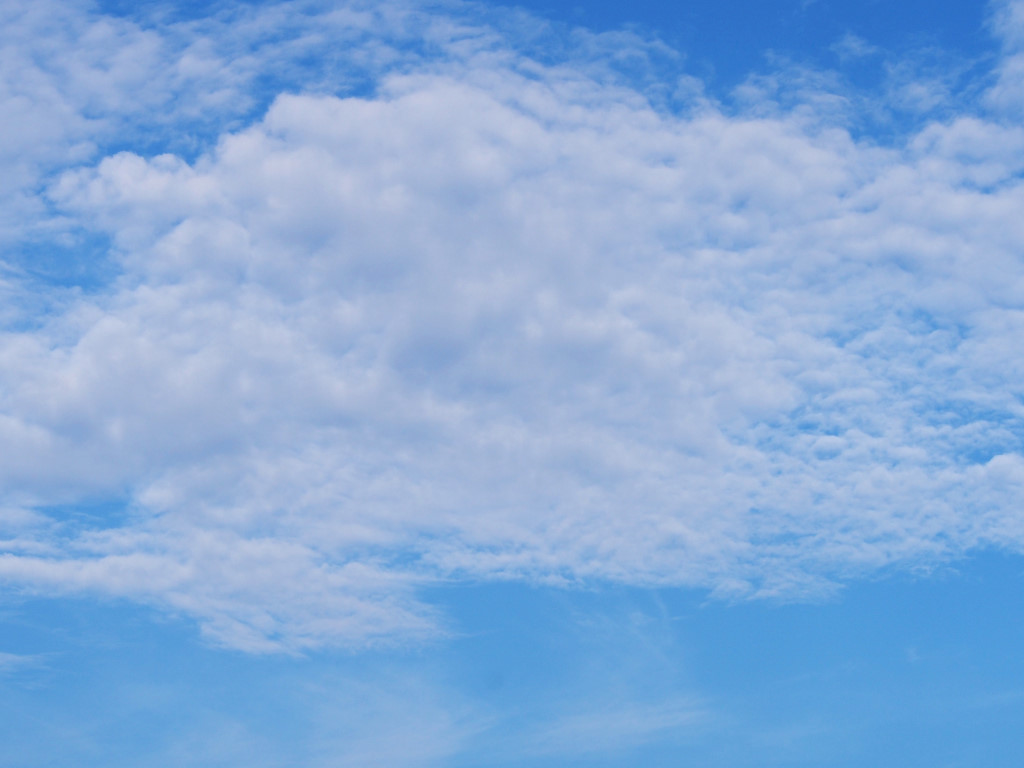April 25th, 2015
I wake up in the undisputable luxury of the Sittwe hotel, the blissful comfort of the room probably as far removed as could possibly have been imagined at one of the competing establishments, a horror I don’t even want to contemplate at the moment. Of course, this luxury represents the consummate counterpoint to the living conditions that befall many people in this state, particularly if you are not of Buddhist persuasion.
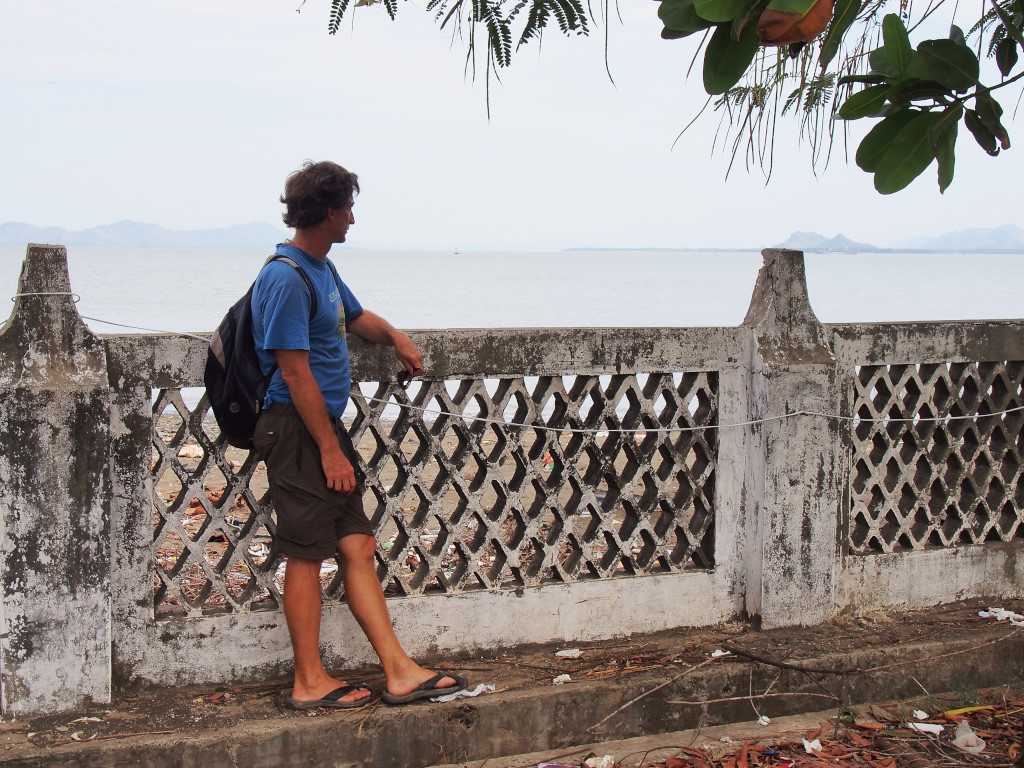
Unceremonious washing, followed by a trip upstairs to the rooftop restaurant, where a few NGO workers and visiting business people have made themselves at home. The wide screen television blares Christiane Anampour and her ilk, holding me utterly mesmerized over plate upon plate of generous buffet food, particularly the longwinded reportage on the son of the great Tanzanian Gogo musician Hukwe Zawose.
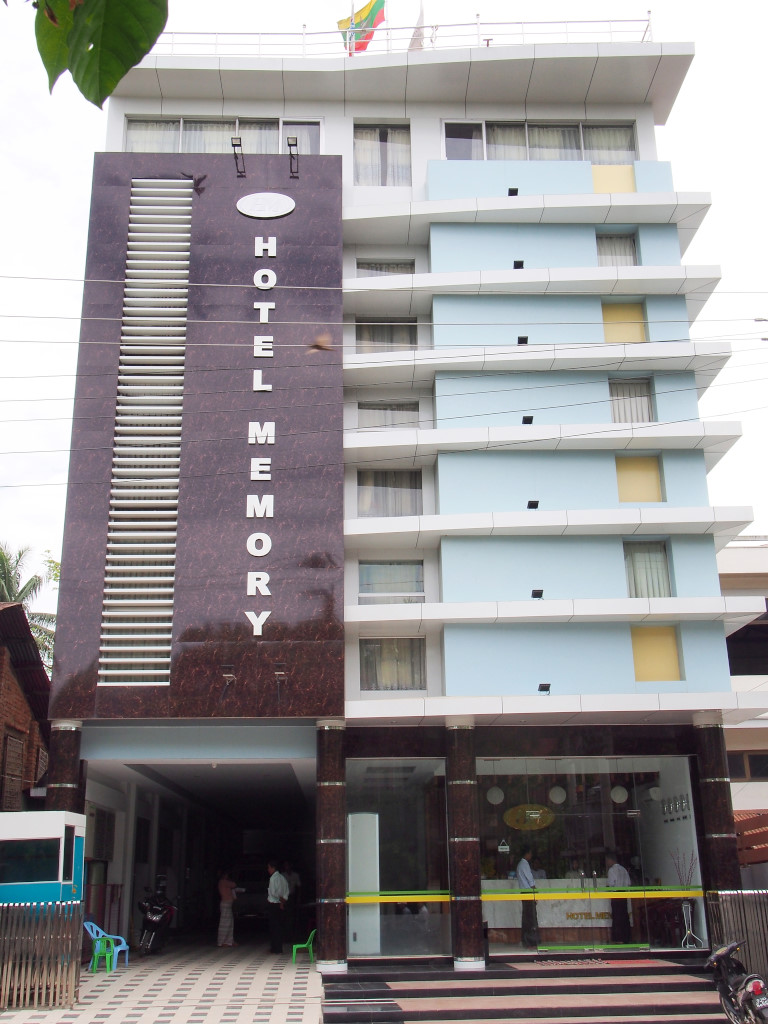
Back in the room, I feel somewhat unwell from the mixture of foods just ingested. More writing, and then the dreaded follow-up to yesterday’s debacle at the bus station, requesting the demure young woman at the reception desk to call the police to assist in resolving the matter.
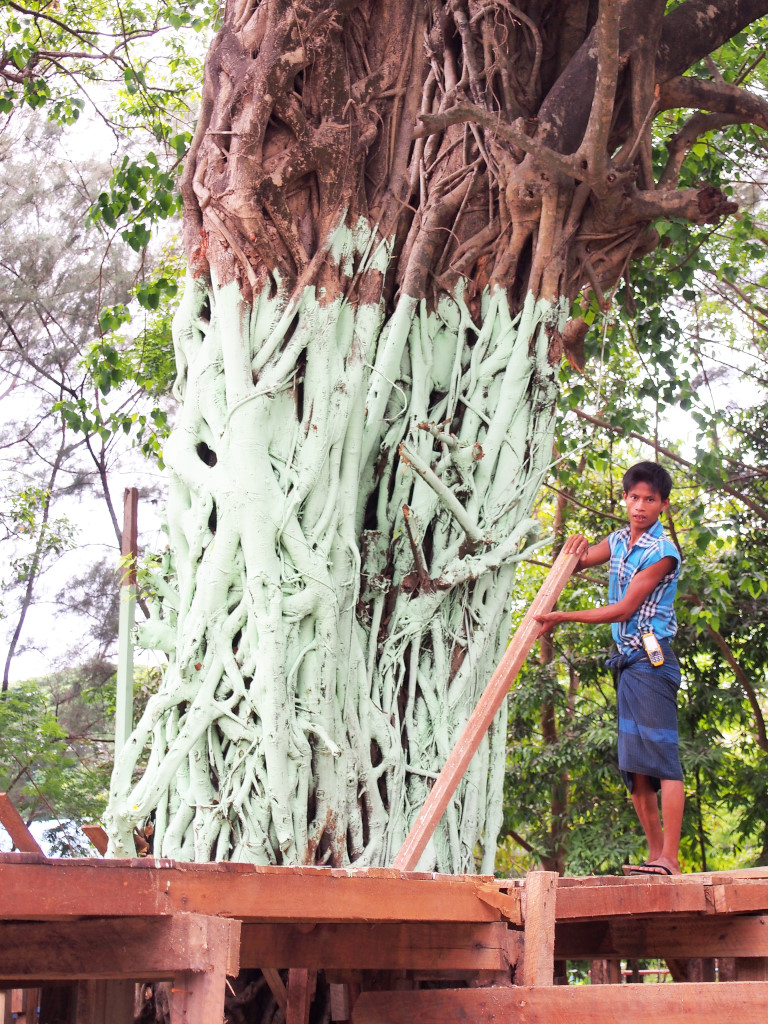
I wait downstairs for the police to arrive, and the fully kitted officers don’t disappoint, what with their pressed uniforms, taupe shirt and blue plants, black Oxford pumps, holstered guns, and the classic Burmese floppy hat with curled brim.
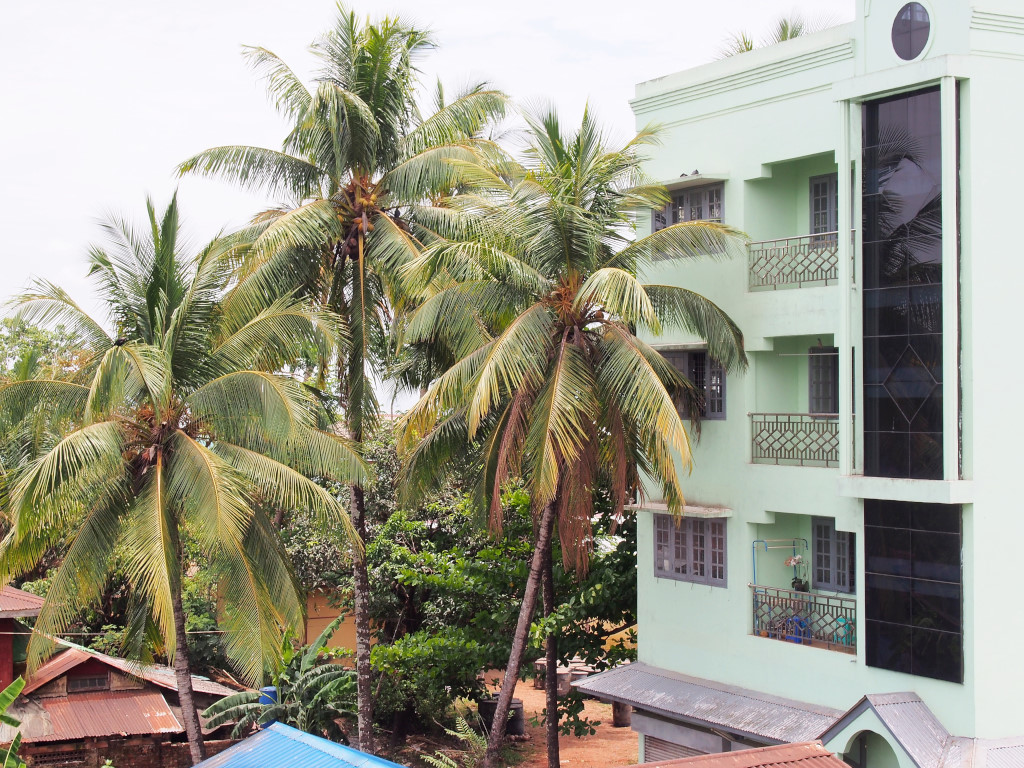
The police officer takes in the facts of the situation in Burmese, that I was sold a ticket for 4,500 kyat excess, that I was sold a ticket in Mrauk U that was not recognized by the bus company at the station in Sittwe, and that the agents for the bus company refused to be cooperative and issue a valid ticket even after hours of negotiation.
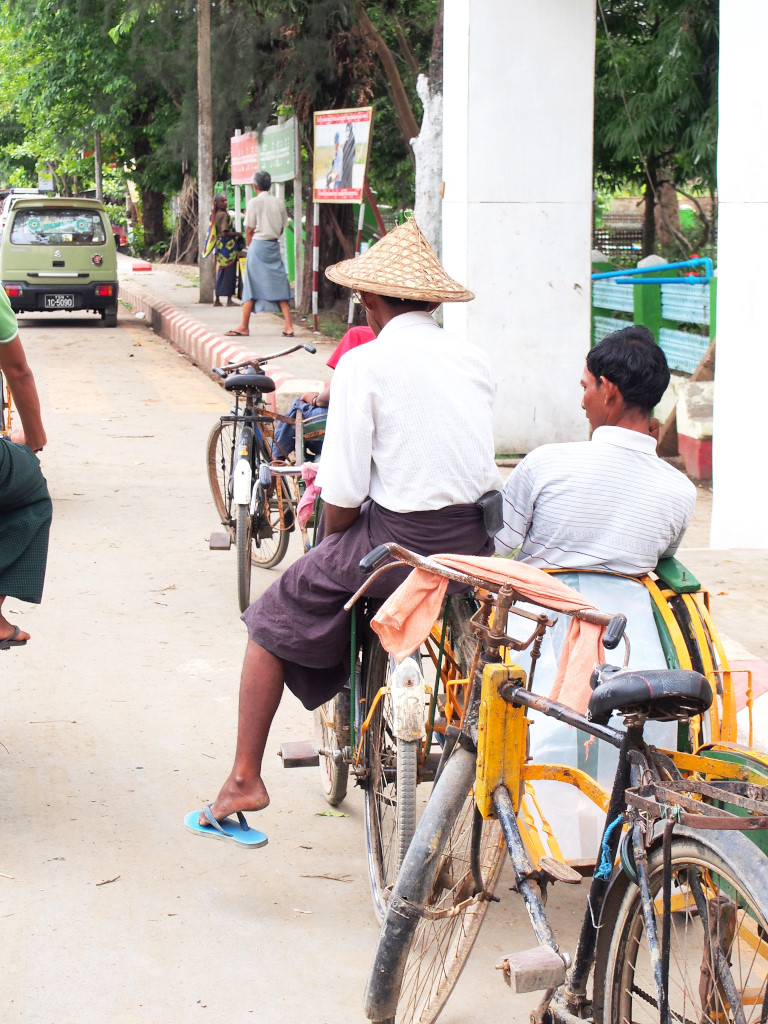
The senior officer listens attentively and issues several questions authoritatively, however, it doesn’t take much to convince the man of the mishap, as the Manthitsar company’s bad reputation is no secret, and the same goes for Shwe Moe in Mrauk U.
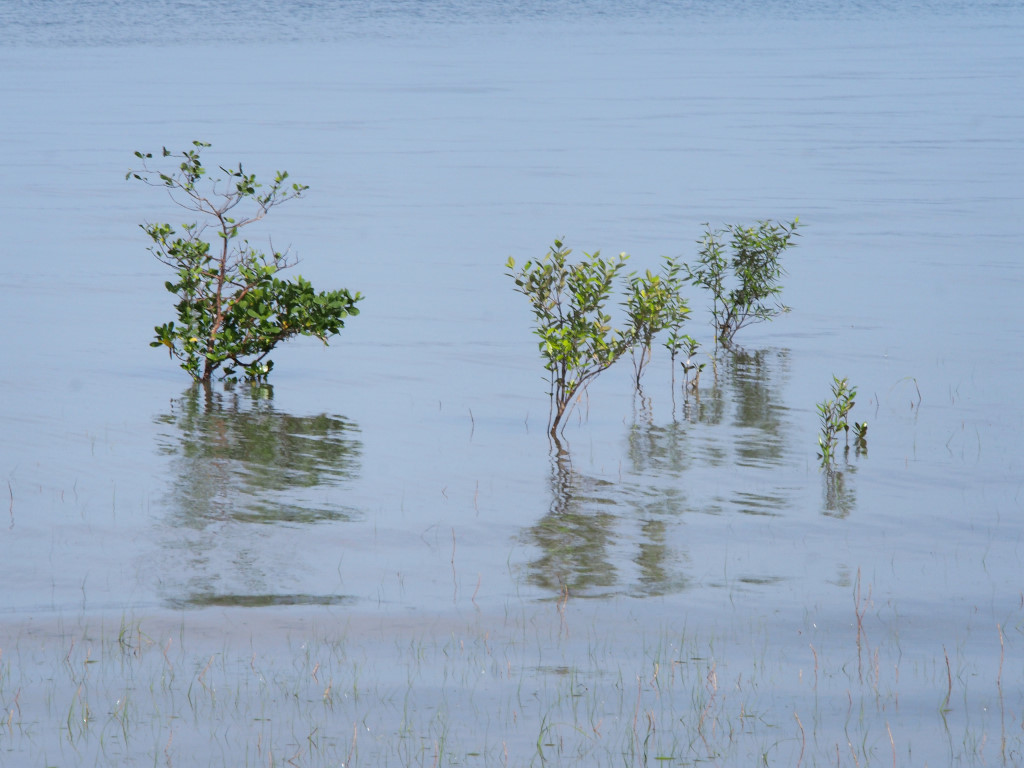
The men politely drink the coffees proffered by the attentive hotel staff, then are off to the bus station to resolve the matter.
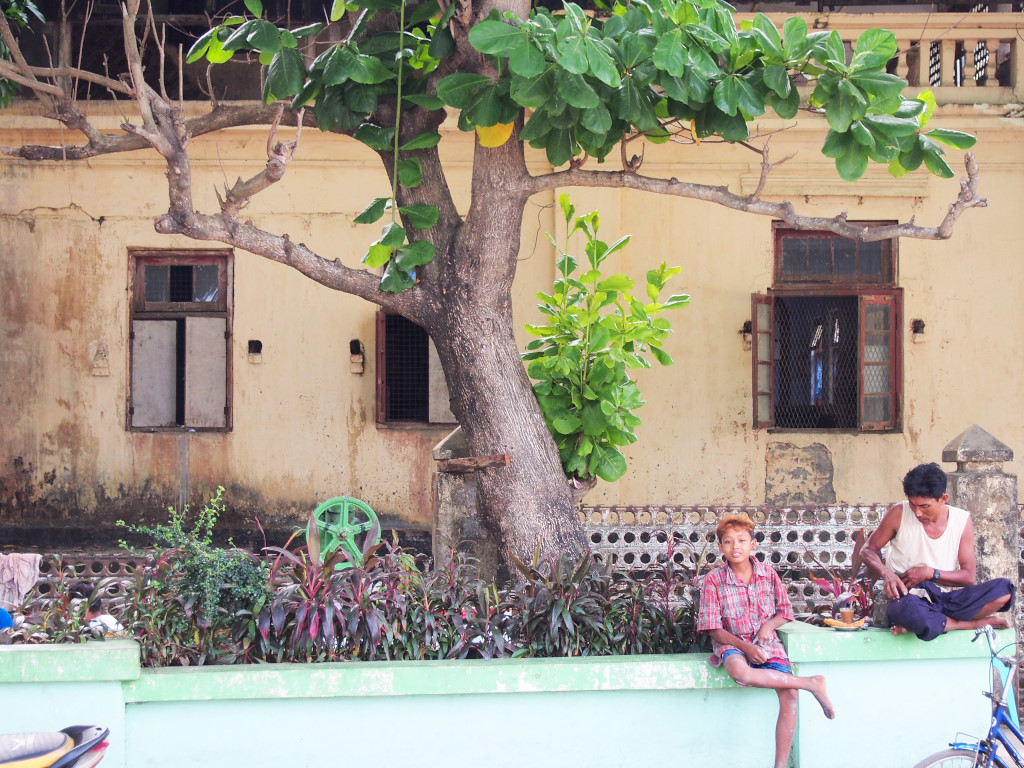
It astounds me that the bus company would be so foolish as to push their luck with a persistent tourist who has been clear about his intentions of escalating the matter to the police, as this matter could bring their company closer to a disciplinary action, something that could cost them more than just a bus ticket.
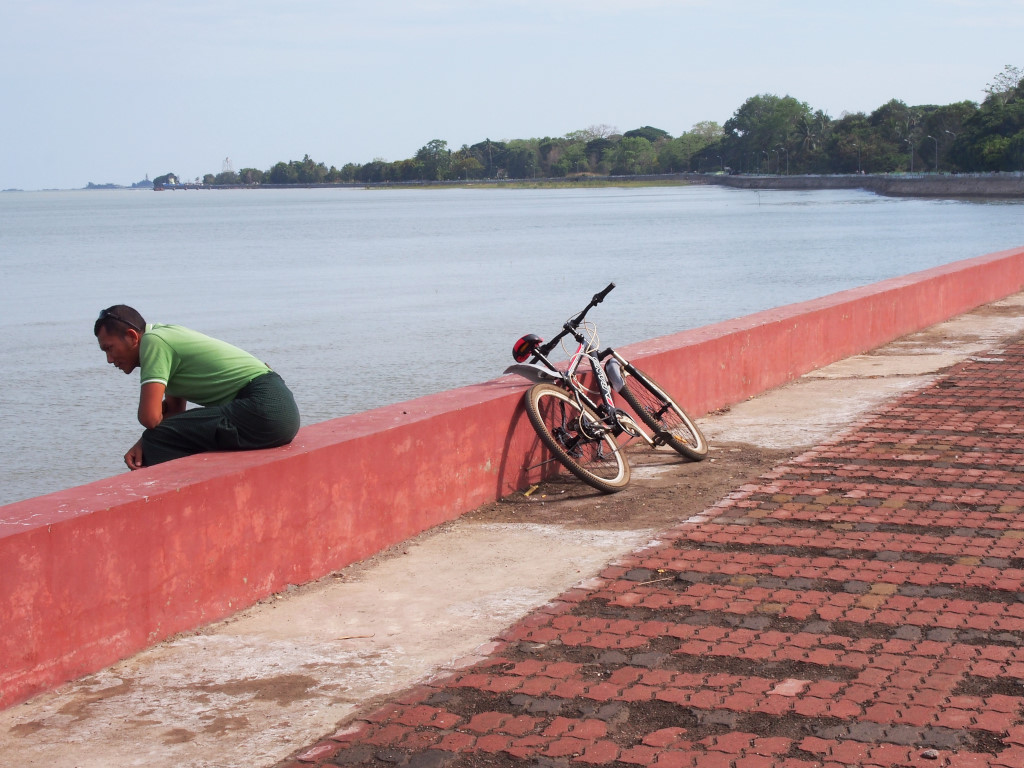
The two women waiting for a taxi work for a humanitarian NGO intent on helping build peace in the region. The one from Seattle tells me the situation is difficult, but it is not easy to paint a brush between good and bad.
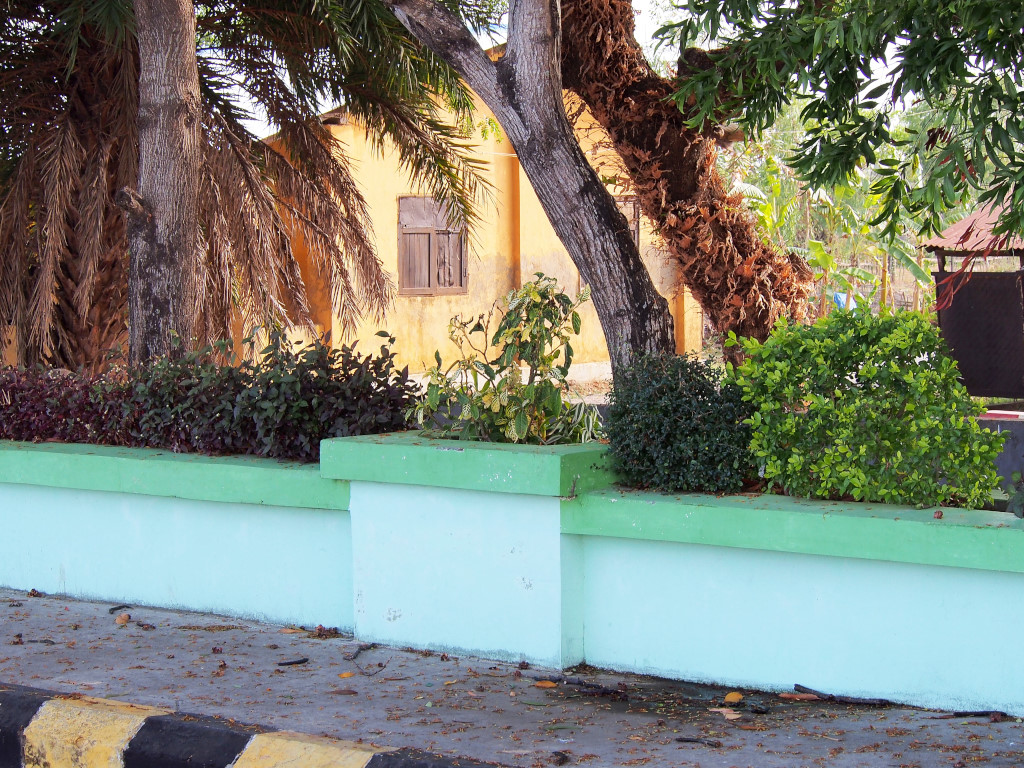
The gracious young woman at the reception tells me her own tale of woe, having worked for a decade in Dubai, saved some $10,000, come back and opened a business with her brother about which she knew nothing, never mind that neither of the two had any idea about business to begin with. In short order, they lost all their savings.
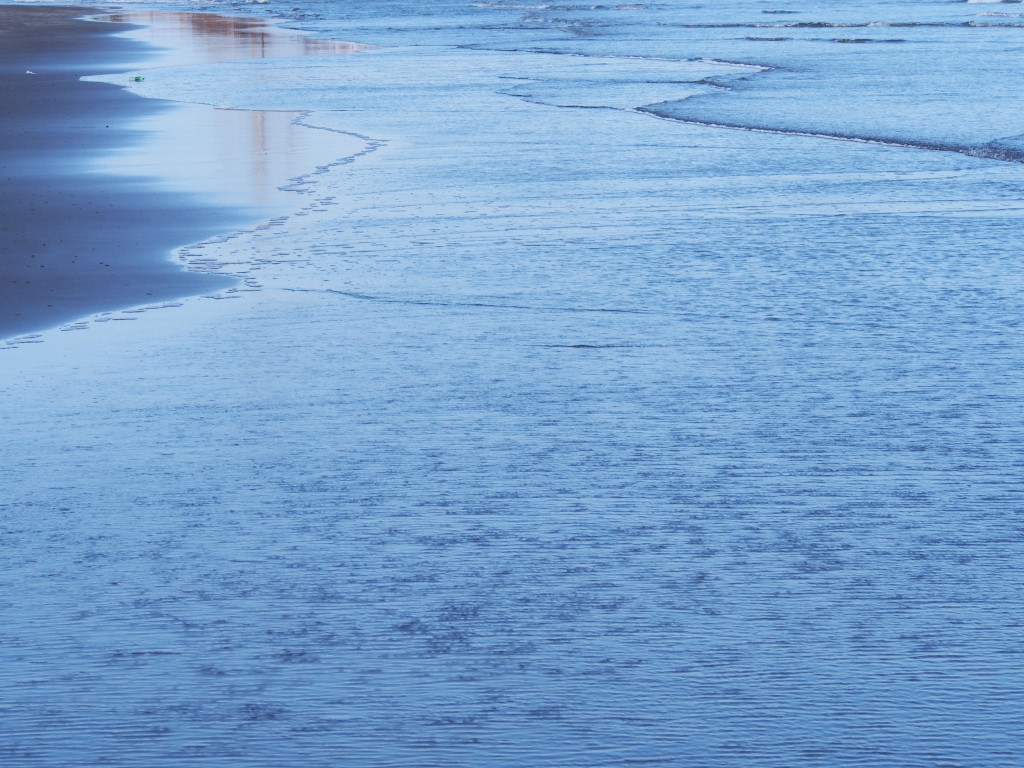
She was saddened by what happened, but unperturbed, motivated to open up a bed and breakfast for foreigners in Bago in several years time.
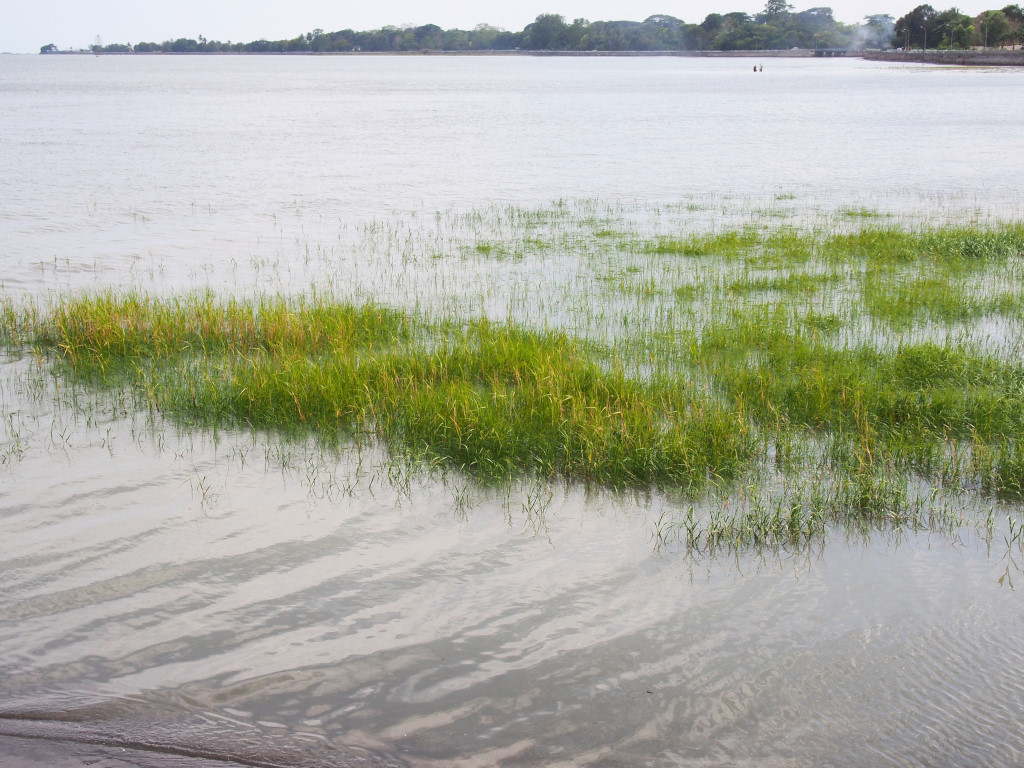
The police eventually return, courteously presenting the original bus ticket in addition to the ticket that the agent had written, but refused to give to me yesterday. I will be sitting in seat number 1 and be given a refund of 4,500 kyat at the bus station.
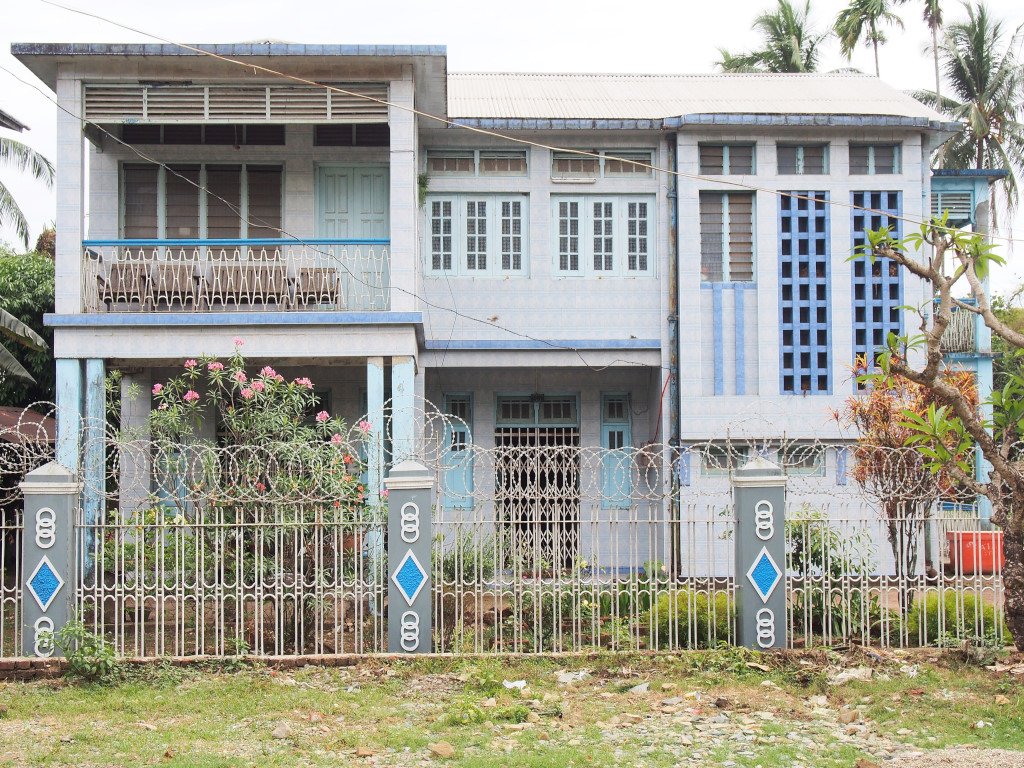
Both these police officers as well as their colleagues in Mrauk U who have been apprised of the situation will be on call on the 27th, and available if any intervention is required. I doubt the bus company representatives would be stupid enough to push their luck even further, now that the police have gotten involved.
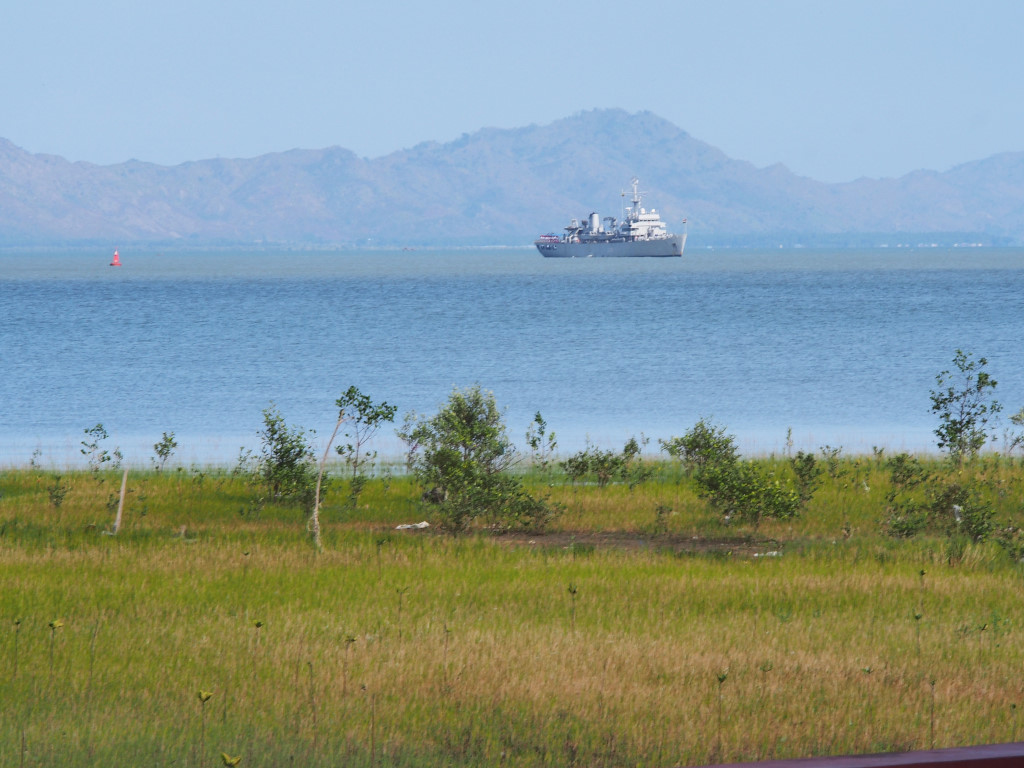
I shake their hands vigorously, thankful for their decisive action, resolving this ridiculous situation once and for all, although I regret having wasted so much time in Myanmar on such trivial issues. I emphasize that visitors come here first and foremost to take in the amazing people of this country, most of whom are the image of honourable (unless you are Rohingya, of course), and so it is essential that such individuals should not be allowed to ruin that impression at the expense of the rest of the populace.
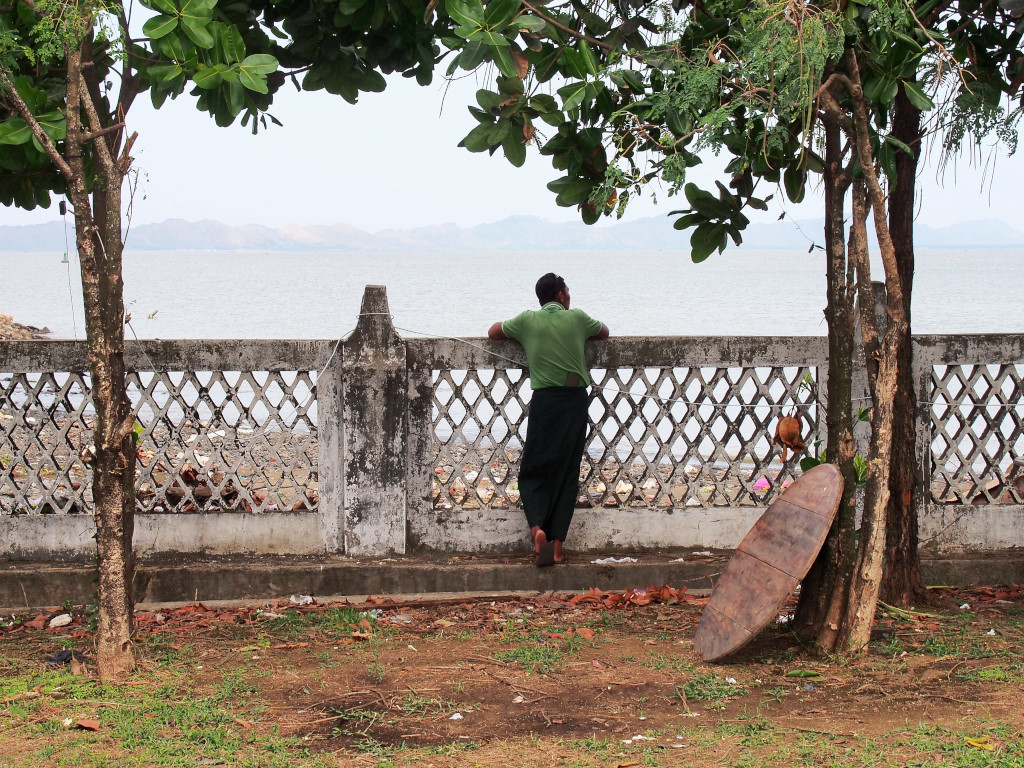
Privately, I recognize that if I had been a local, the police would never have bothered paying attention to my issue, but as such, all the local people who could have been cheated by these people will be vindicated in advance.
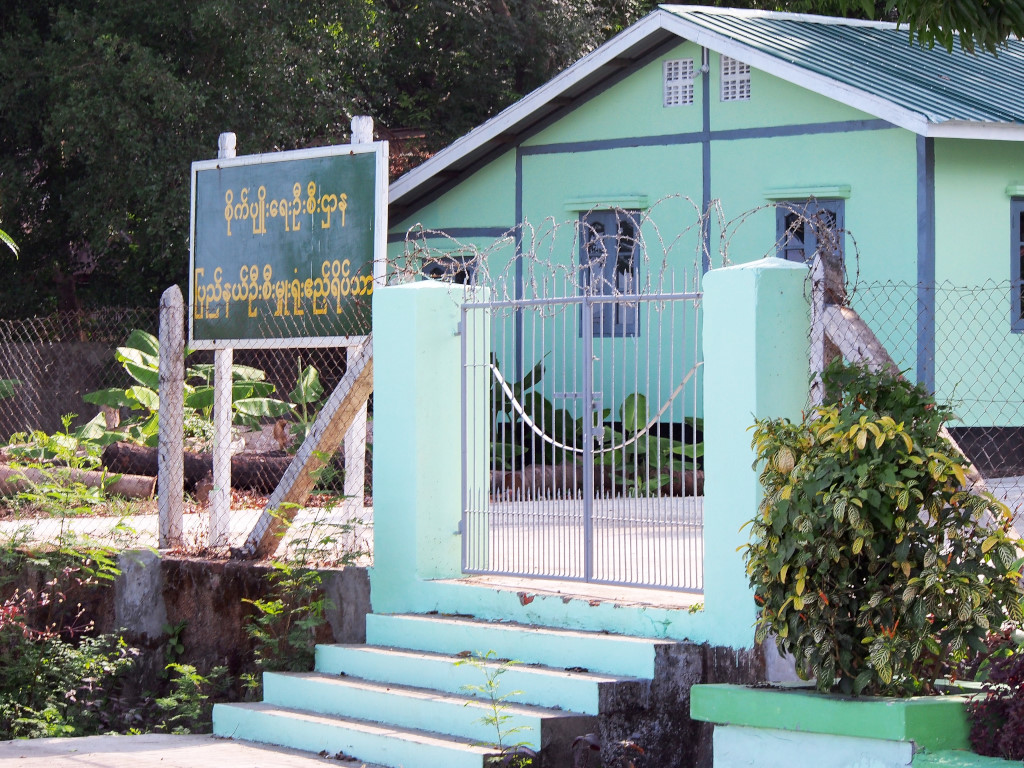
I take a handful of photos of the foliage-rich enclave the hotel is set in, faded commercial establishments alternating with rambling bungalows old and new, and then a reprise of yesterday’s brief tour of town, cycling slowly amidst the pedicab traffic, the functional stone structures with generous balconies and baby blue wooden shutters faded over the years protected with thick coils of barbed wire, whose proliferation inspires little confidence in the security of the locale.
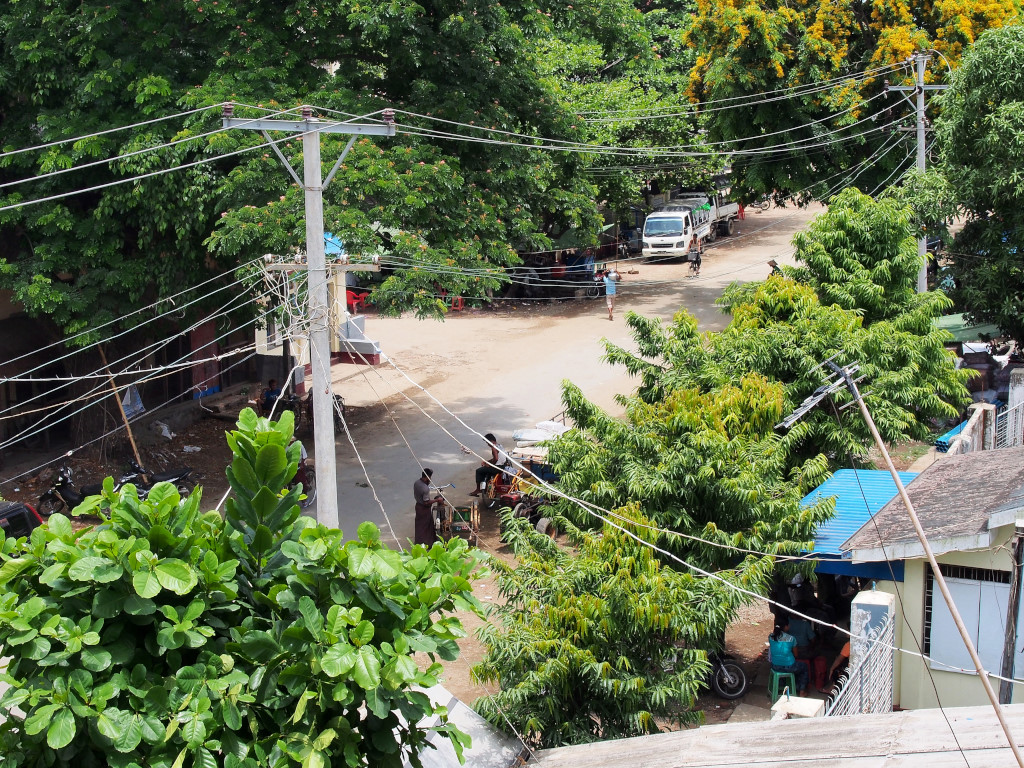
One particular house strikes my fancy, the pale lemon structure whose main floor is raised half a story above the ground, a pair of matching windows on either side of the doorway on the raised portico, all three crested with a window-bearing lintel, the roof of the principal structure crested with a windowed turret with matching smaller corrugated metal roof. A symmetric array of exotic palms and pines are laid out in front of this minor neo-colonial masterpiece.
Now that Thingyan is well over, the small stage is being dismantled that would have been dwarfed by the massive structures erected throughout Yangon.
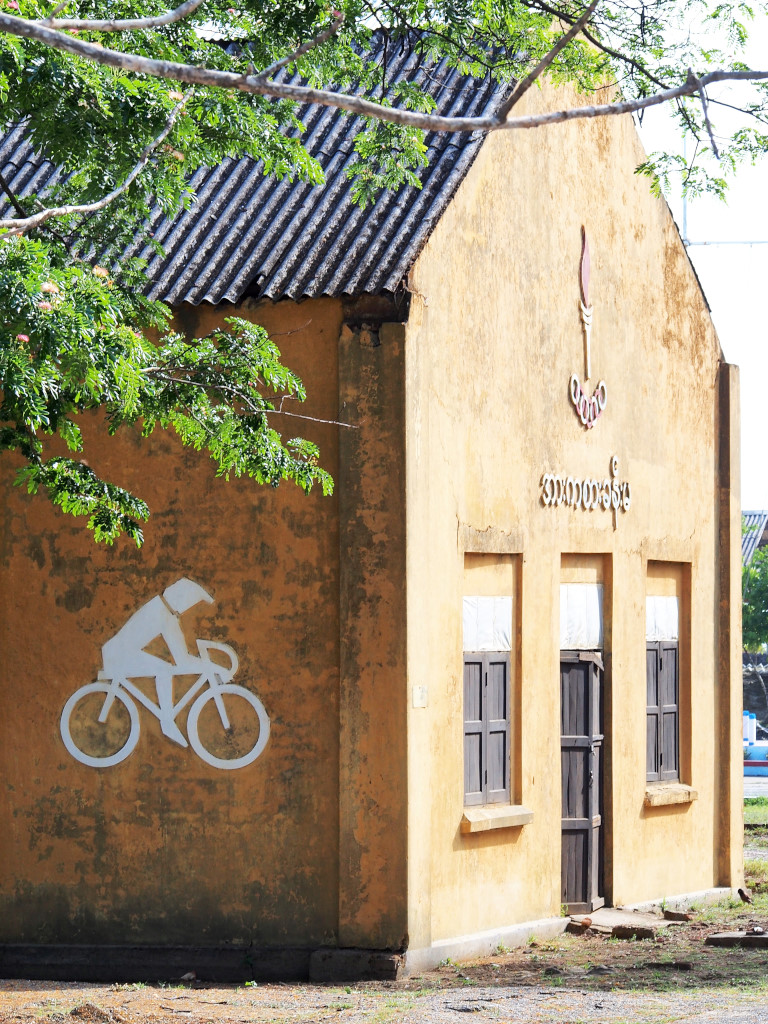
At the clock tower, a side road leads to the water, and seemingly in the midst of an extensive renovation, another one of the town’s formal restaurants, the Arian (or is it Avian?). The yellow and red structures reflect a somewhat rudimentary aesthetic. They are set on an expansive lot whose garbage-strewn back leads to a stone lattice fence, beyond which are offered stellar views of the neighboring bay, provided you ignore the refuse-strewn sand, the price of being in a poor developing country, and not in an international resort setting.
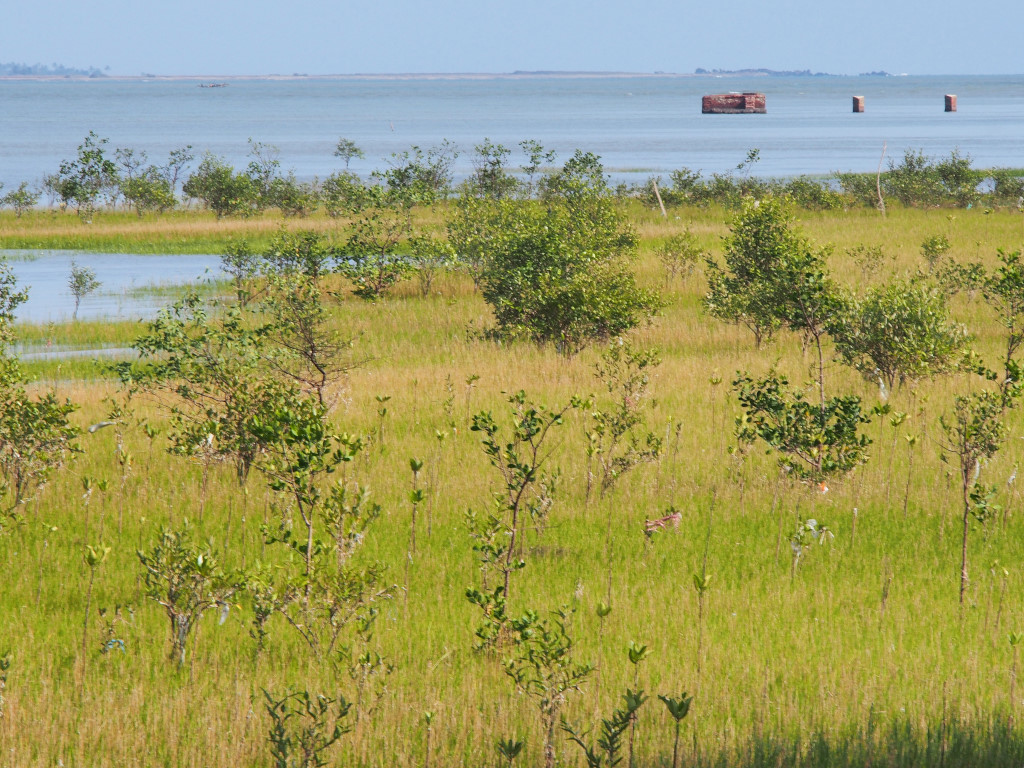
Patches of grass grow near the shoreline, with no more than a few cargo vessels visible in the distance.
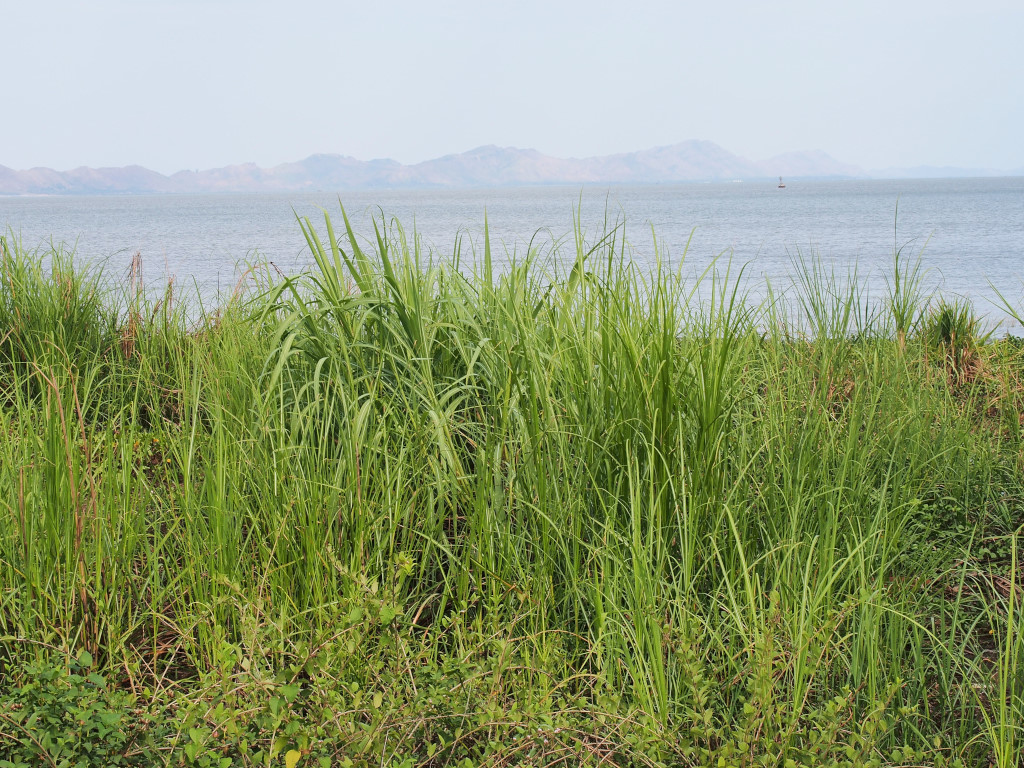
The fact that the heat has dissipated in the last few days is such an incredible blessing, as I can actually enjoy my time here, without being reduced to a gelatinous sweating mess. The paved road weaving southwards along the periphery of the bay is surprisingly intact, the entirety of its trajectory lined with a stone sidewalk and red retaining wall, with an alternating black and yellow curb.
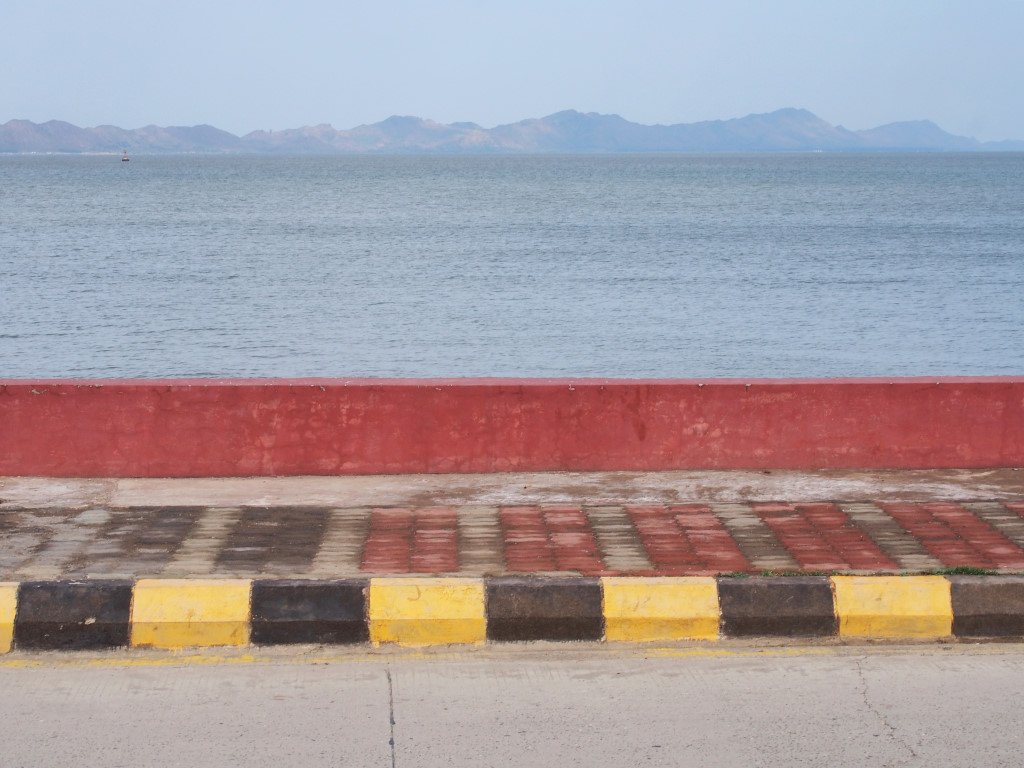
The opposing side of the road is lined the entire route with pairs of pale green planters alternating with pairs of wood and wrought iron benches, to the back of which are set extensive naval compounds.
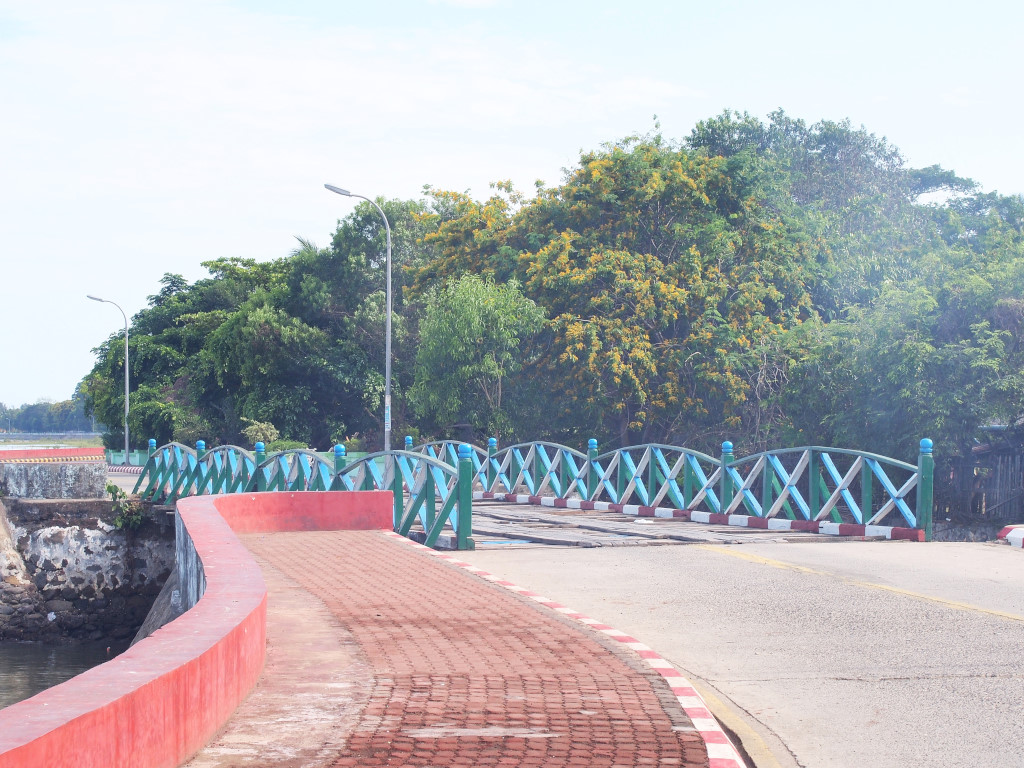
Beyond the retaining wall, a few young men give up on their belated hunt for cockles. The clear water gives way to extensive grasses, from which emerge small bushes on which several white egrets are perched, only to fly off as I approach. A lone battleship sits on the bay, provoking the question how many more boats the Myanmar naval disposes of.
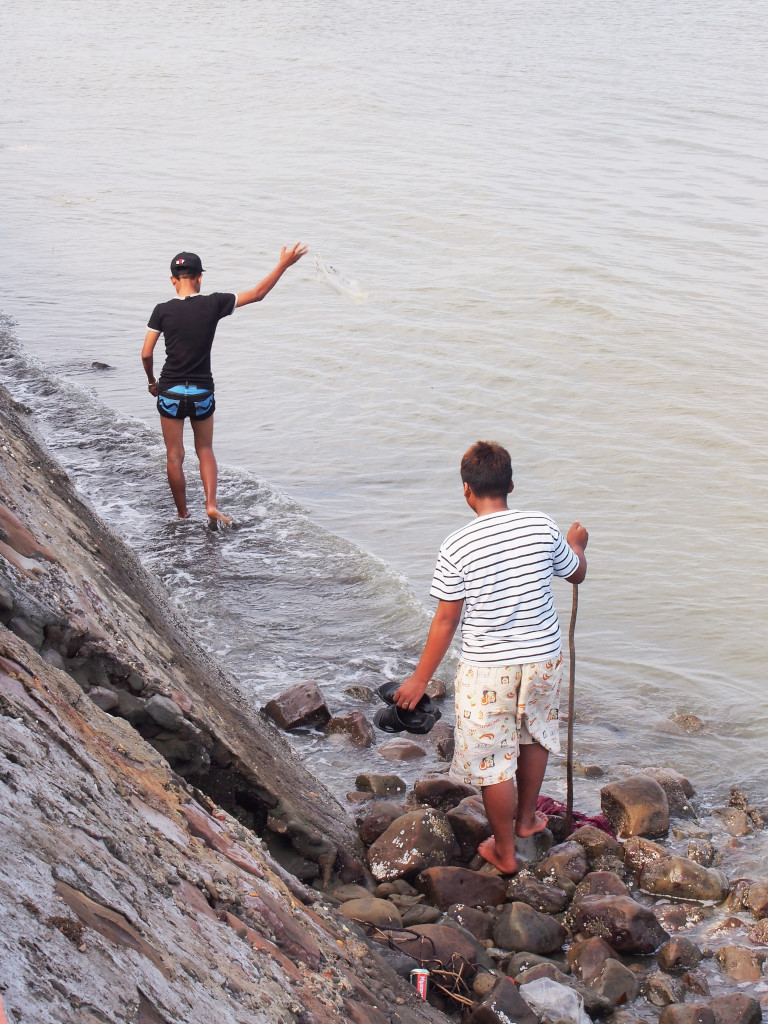
The benches provide a comfortable respite for small groups of young men lazing through the afternoon, presumably naval cadets from the neighboring compound, in addition to a few couples present on romantic interludes.
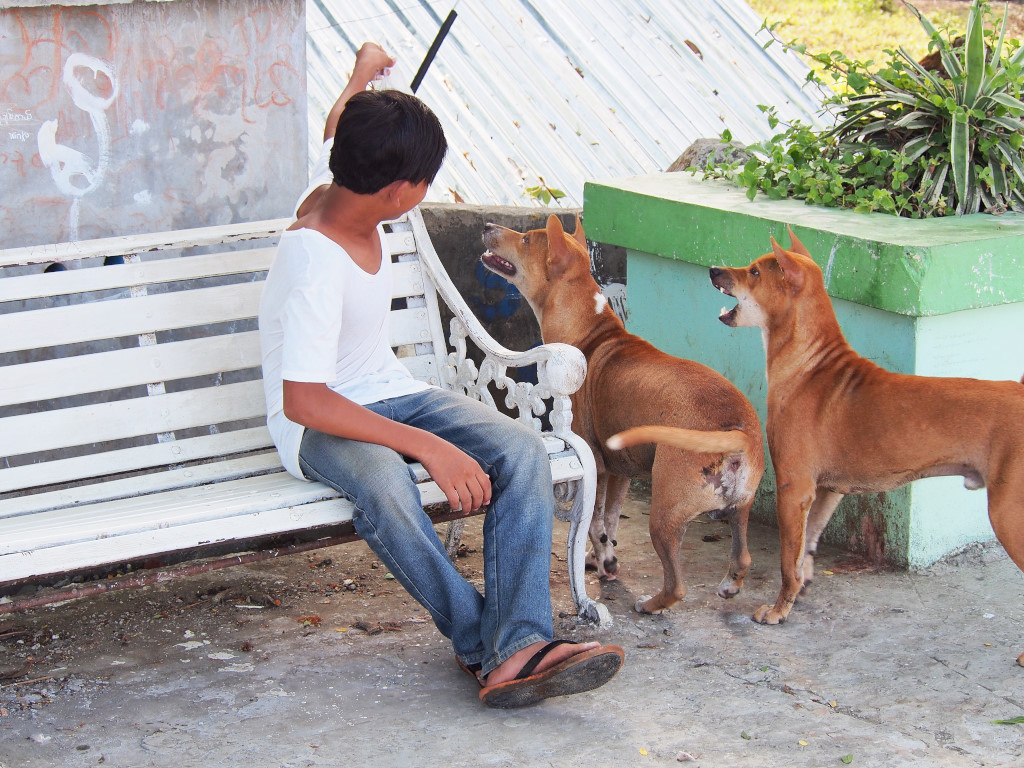
The winding waterfront road culminates at a promontory under construction. The squat green lighthouse beckons to nonexistent ships on the horizon, a crew of swathed construction workers building a new pier immersed in a cladding of wooden poles, motorcycles bearing young hipsters occasionally whizzing from the enclave.
The surprise comes when rounding the bend in the road, the shimmering waters of the Bay of Bengal disappearing into the horizon, the canvass of cotton batting rising far into the heavens.
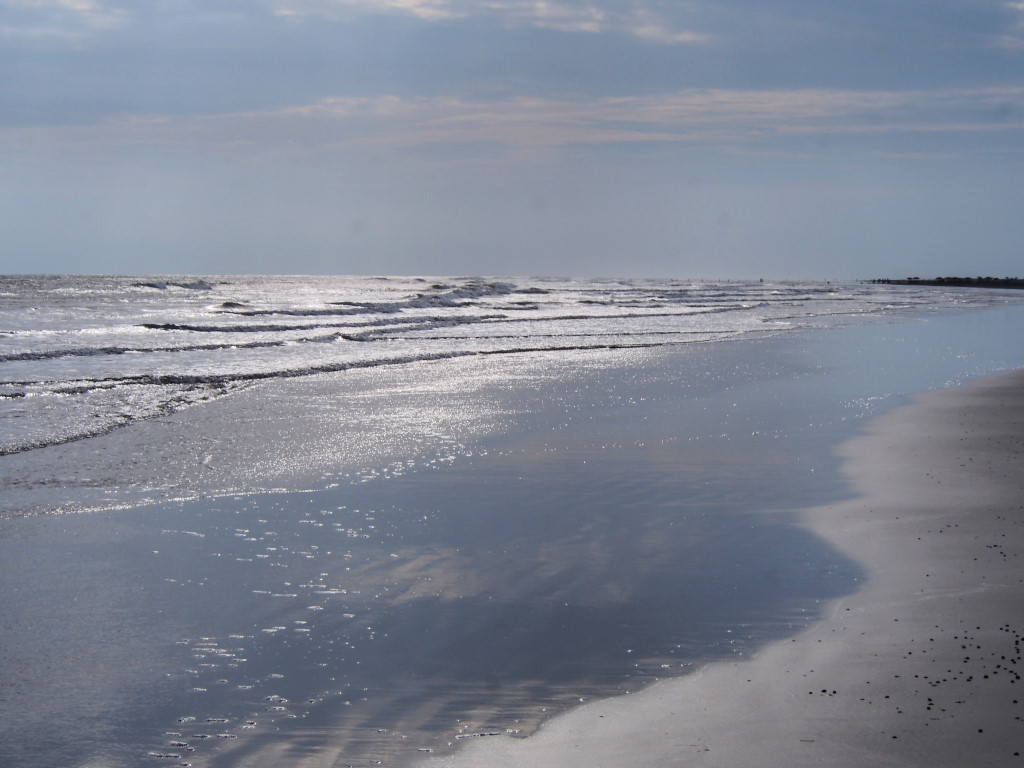
Scattered across the broad black sand beaches is debris, small shells, and the tiny sand-pebble detritus of excavating crabs. The fine sand is firm under the feet. Judging by the line of waves growing evenly from the sea, the drop-off towards the sea is gradual and shallow. The beach is almost perfect, if it weren’t for the colour – and the remoteness of this region.
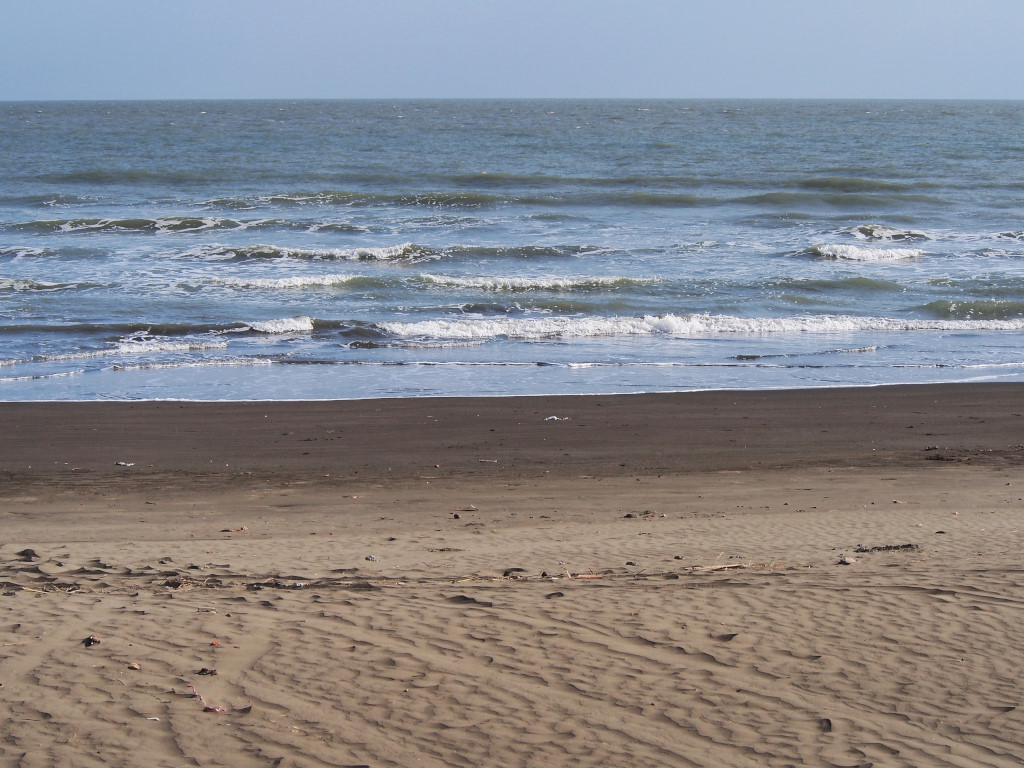
This is one of the few coastal areas even accessible by paved road in the country, despite the fact that the country is surrounded by coastline. Even so, it takes an arduous 24 hours to get here by bus from the capital – provided the road doesn’t close again due to a flare-up in the ongoing local insurgency.
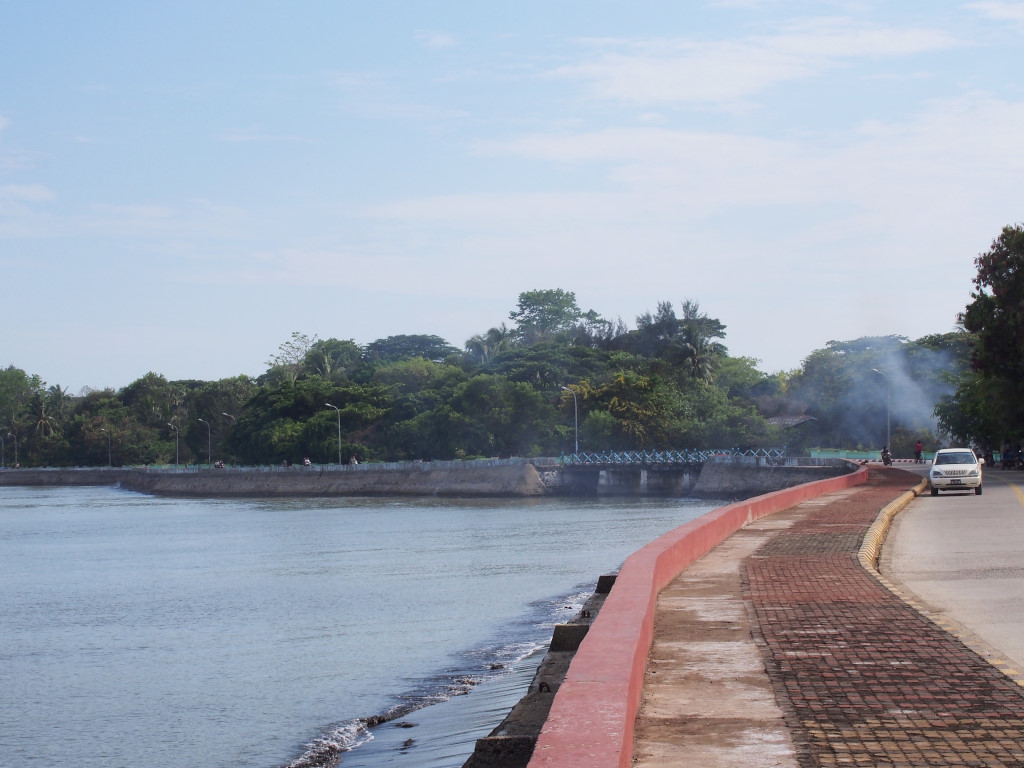
Under my feet, the thin tendrils of water slide easily upwards toward the distant retaining wall, mirroring the blues and creams of the sky above. In the distance, a handful of families with children play in the the water, wisely not venturing beyond the shallows. The shoreline is dedicated to makeshift soccer pitches, the boundaries of courts drawn in the sand, with tatty nets erected at either end of the field.
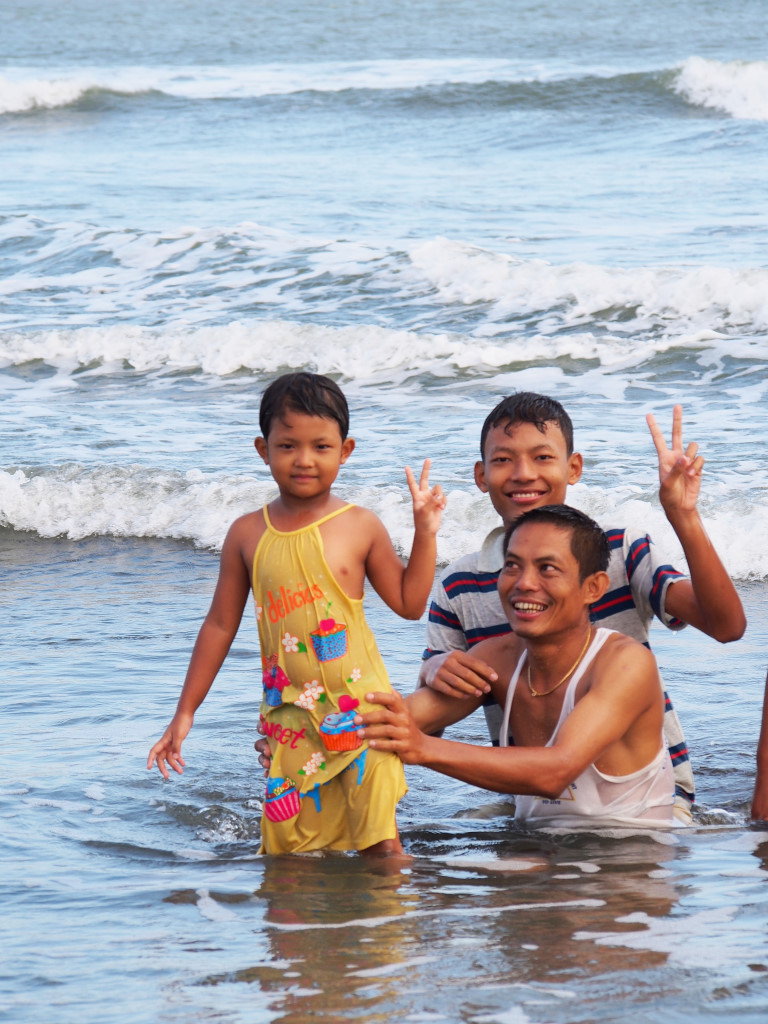
Teams of young men play enthusiastically, many of whom probably originate at the neighboring army and naval bases. The roar of loud engines interrupts the peaceful seaside setting, heralding the arrival of a plane from Yangon.
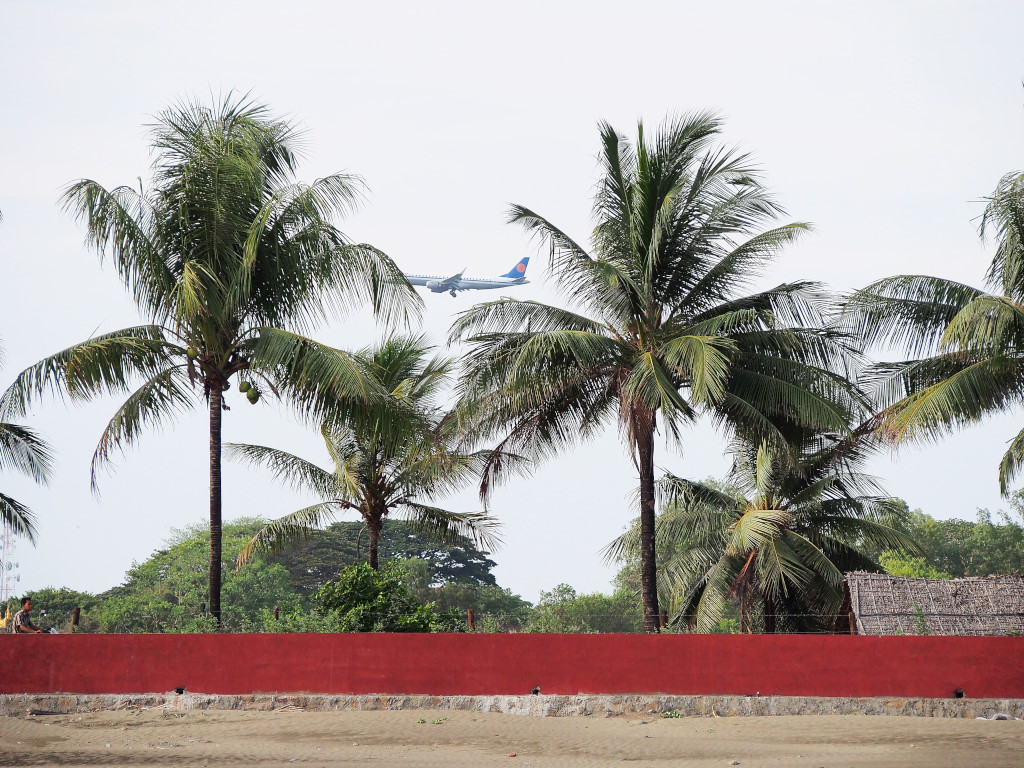
The seaside eateries are little to write home about, the grilled fish and chicken not fresh. The canopied thatch establishments lining the roadside are filthy with the remnants of afternoon drinking sessions, little to no effort having been made to clean the premises.
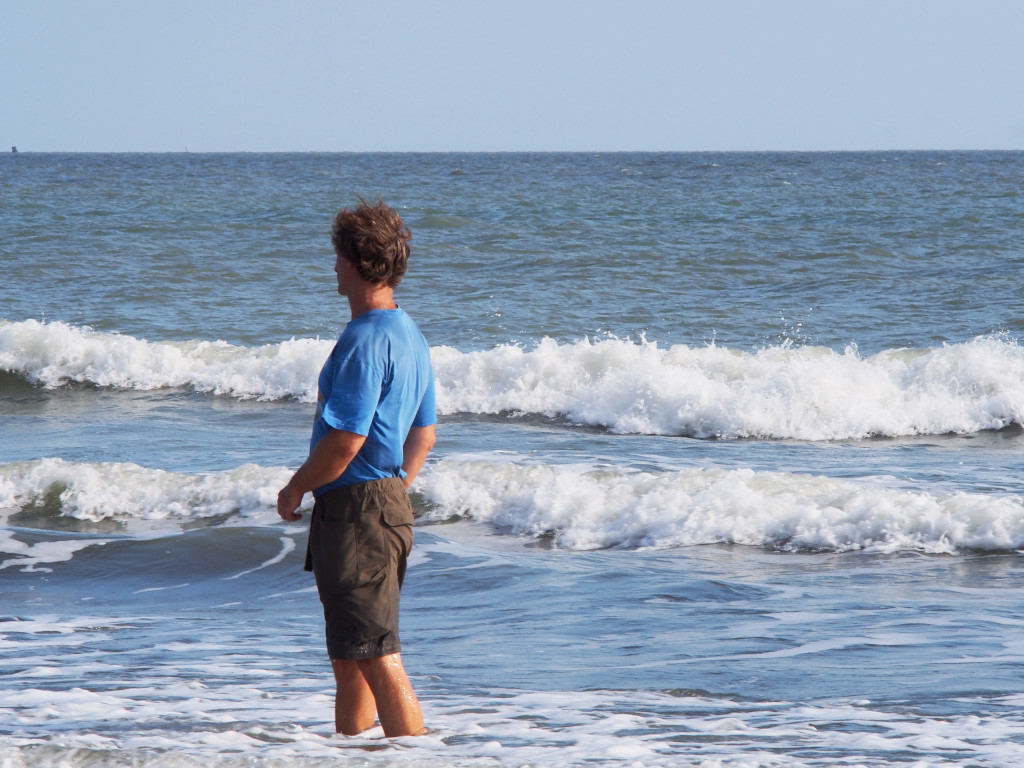
A young Buddhist monk stops me on the road back to the View Point, telling me he would love to learn more about the world, and hence is studying at a Catholic university in Bangkok. He refuses to limit himself to simply studying Buddhism, a regimen which almost all of his fellow believers follow devoutly, but which will not help the world achieve peace, an admirable and yet delicate affair, particularly in this conflict-torn region.
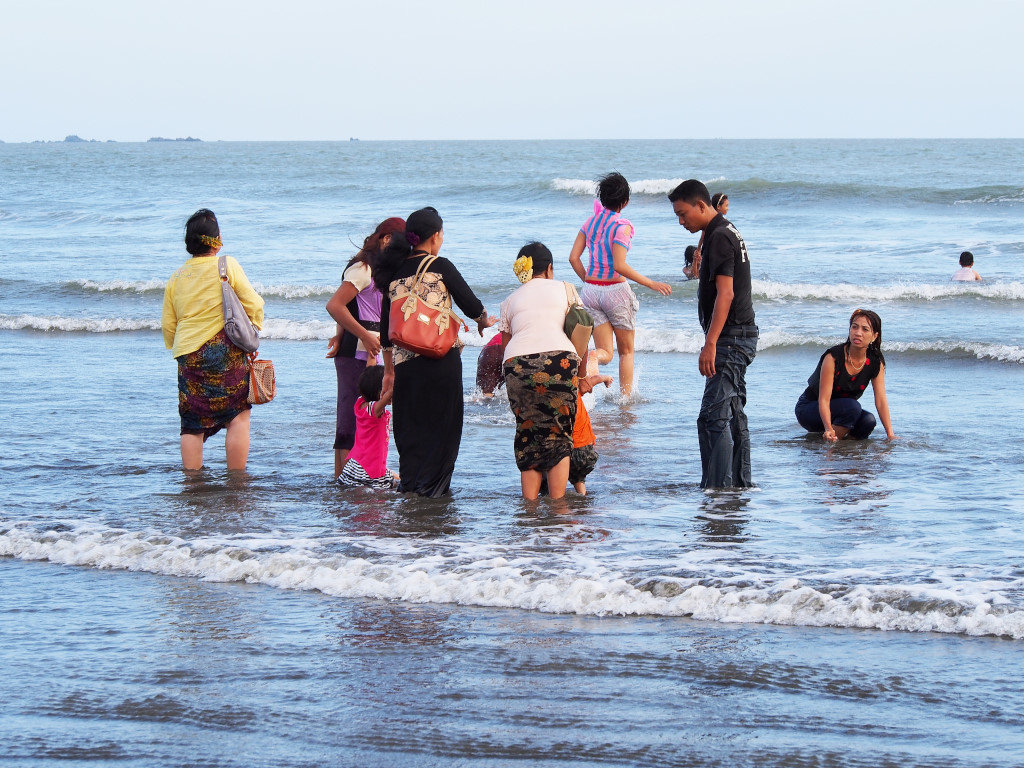
Past the View Point, young men loll on the white wooden benches ranging along the roadside, the jasmine-inflected perfume around us emanating from the torrent of yellow flowers cascading from the thingyan trees overhead.
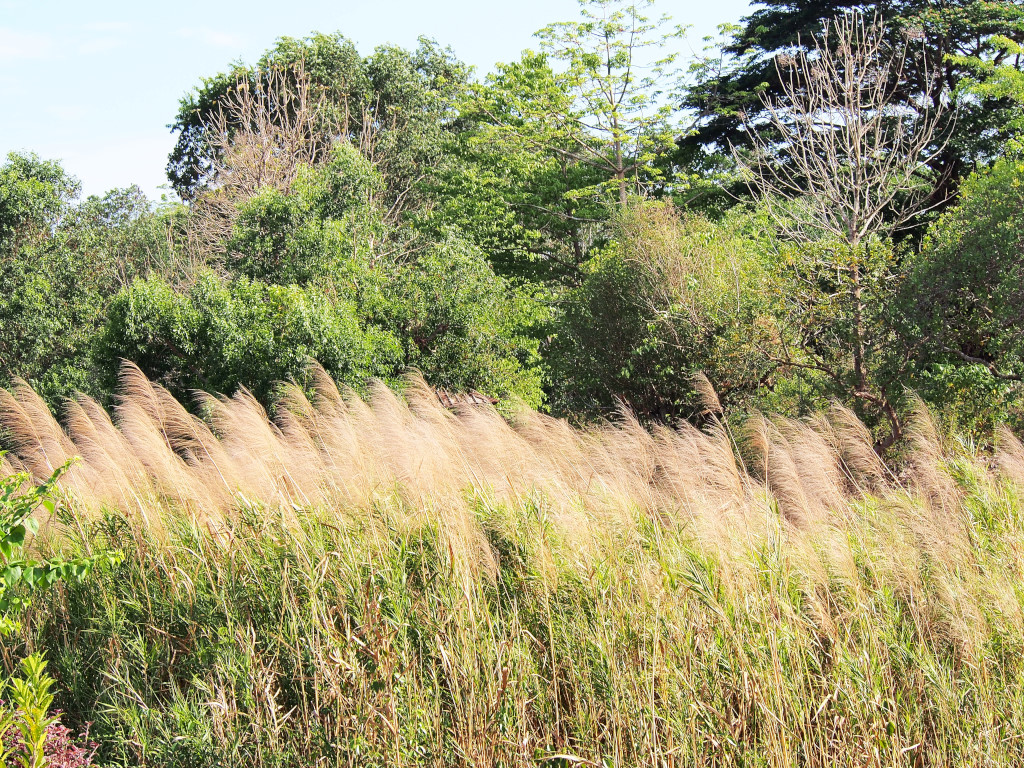
The quandary of attempting to find a suitable place to eat arises again. I amble along past the clock tower and the glimmering Strand hotel, then onward towards the market, consuming one last baggie of marian plums. Further on into the darkness, I pass the nocturnal activities of the rice warehouses and private residences visible from the illuminated open rooms and verandahs, not a single eatery coming into view.
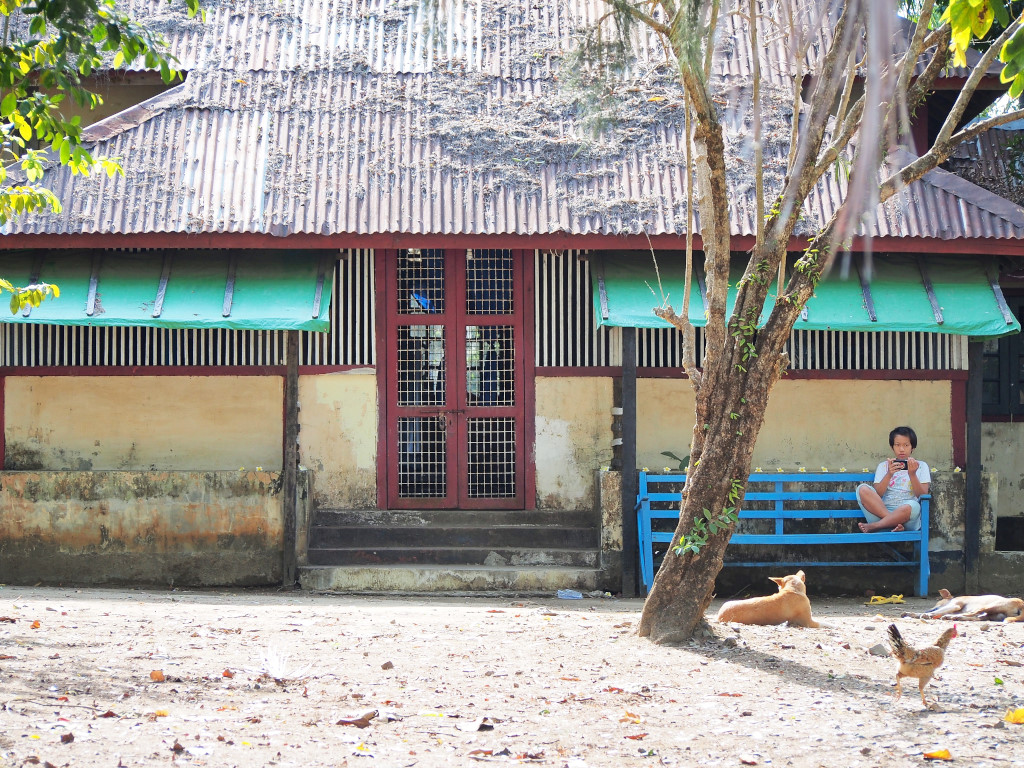
Rejoining the main road at the bridge, there are a few stands selling offal to passers-by. But there must be some better options in this town, offering some selection and quality, and not as expensive as the River Valley.
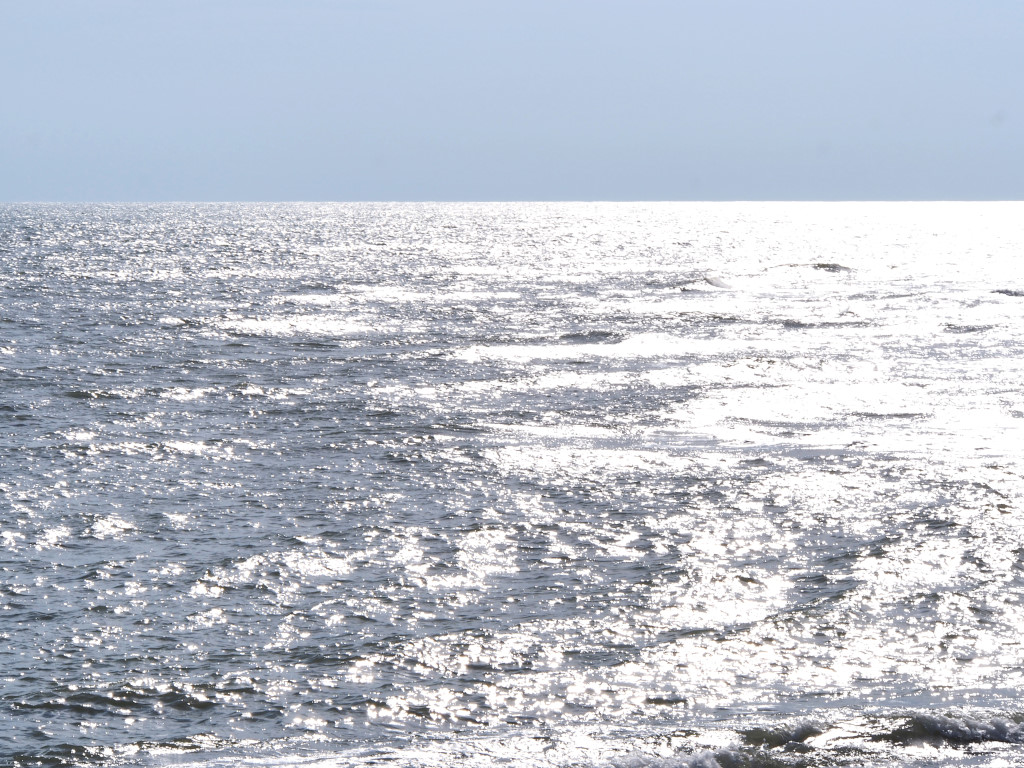
I stop to ask locals on the main road around the museum, and there it is, an alley running parallel to the main road, featuring a continuous row of small, single-room eateries, with small rectangular tables and identical plastic chairs. These modest establishments are ostensibly dedicated to Rakhine variants of Burmese food, the glaring lighting illuminating the crowded tables streaming onto the muddy ground outside and then disappearing into the darkness.
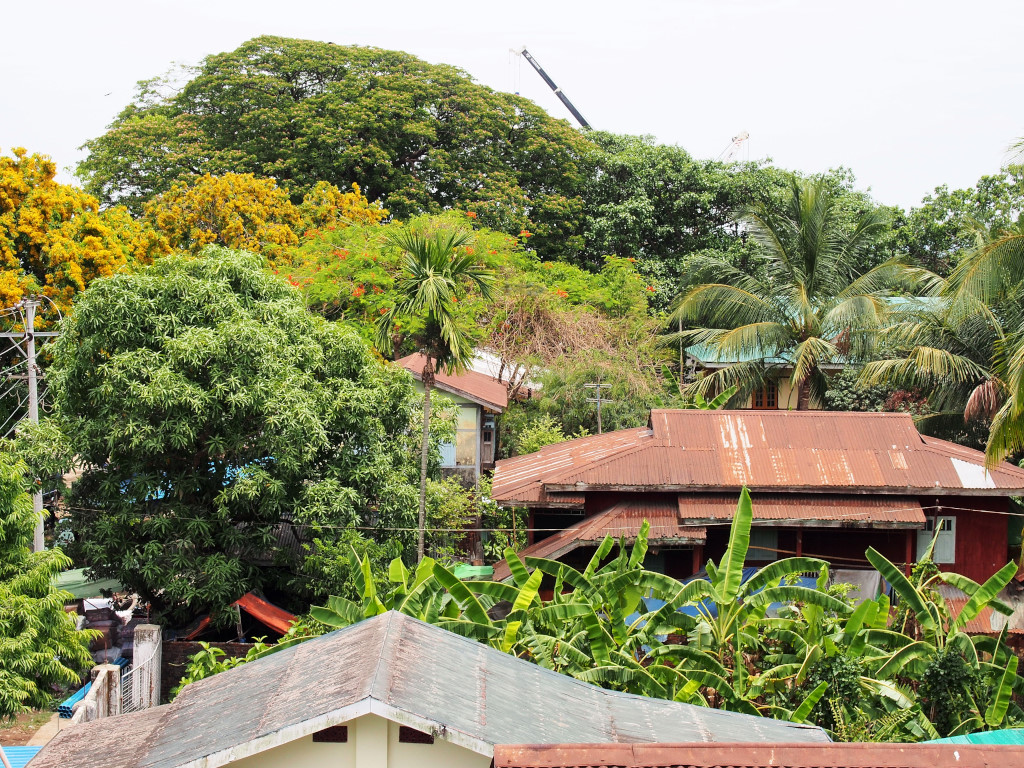
Similar to the food I ate in Mrauk U several days ago, I am reached a hin, including a yellow fish and red shrimp curry, the shrimp tough from having been cooked too long. The fish has been prepared in the same intriguing manner as several days ago, using garlic, onion, chili, and turmeric-based curry power, in addition to what may be fresh turmeric, mustard seed and/or sour mango.
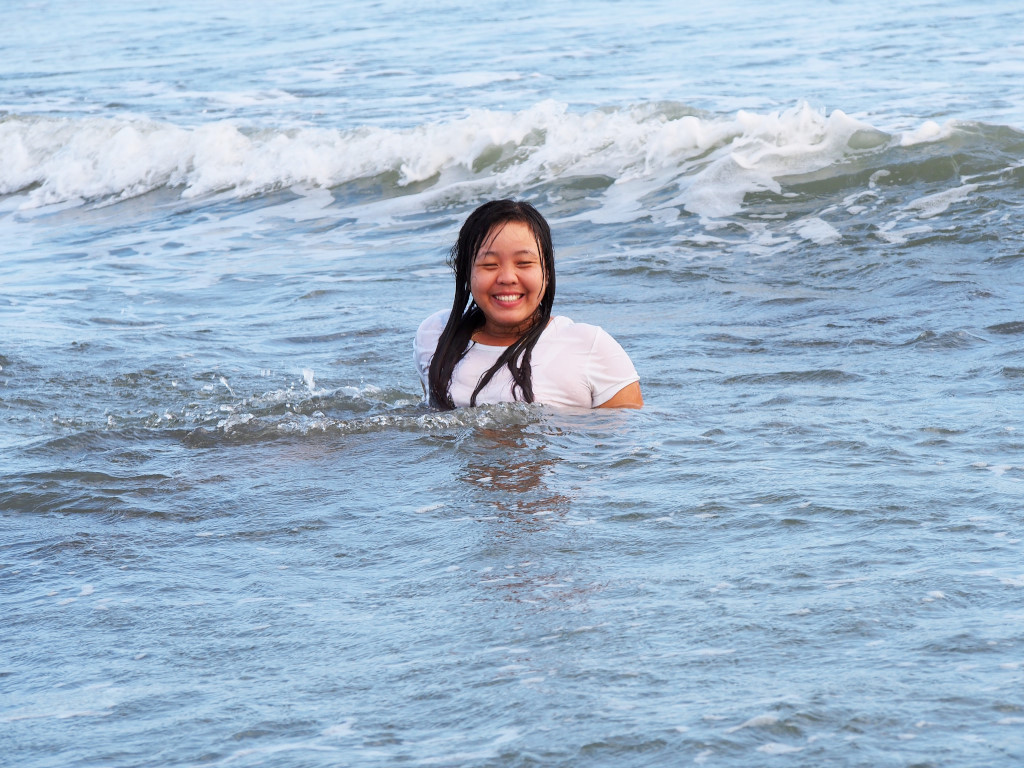
Side dishes include a salad of string and green beans prepared with some chili, garlic, onion and dried baby shrimp; watercress stewed with oyster mushrooms; a dense chutney prepared with green chili; a salad of fresh sliced cucumber served with the raw leaves of the bael fruit tree; and a salad made from finely shredded mango prepared with roasted garlic, chili, and black Shan sesame, in a bath of sesame oil.
